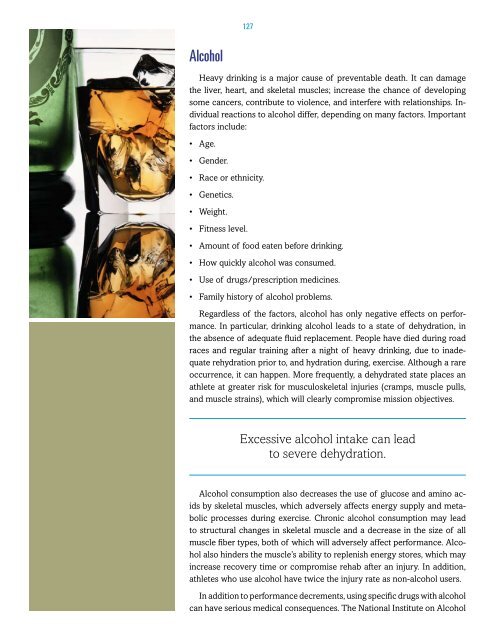special-operations-nutrition-guide
special-operations-nutrition-guide
special-operations-nutrition-guide
You also want an ePaper? Increase the reach of your titles
YUMPU automatically turns print PDFs into web optimized ePapers that Google loves.
127<br />
Alcohol<br />
Heavy drinking is a major cause of preventable death. It can damage<br />
the liver, heart, and skeletal muscles; increase the chance of developing<br />
some cancers, contribute to violence, and interfere with relationships. Individual<br />
reactions to alcohol differ, depending on many factors. Important<br />
factors include:<br />
• Age.<br />
• Gender.<br />
• Race or ethnicity.<br />
• Genetics.<br />
• Weight.<br />
• Fitness level.<br />
• Amount of food eaten before drinking.<br />
• How quickly alcohol was consumed.<br />
• Use of drugs/prescription medicines.<br />
• Family history of alcohol problems.<br />
Regardless of the factors, alcohol has only negative effects on performance.<br />
In particular, drinking alcohol leads to a state of dehydration, in<br />
the absence of adequate fluid replacement. People have died during road<br />
races and regular training after a night of heavy drinking, due to inadequate<br />
rehydration prior to, and hydration during, exercise. Although a rare<br />
occurrence, it can happen. More frequently, a dehydrated state places an<br />
athlete at greater risk for musculoskeletal injuries (cramps, muscle pulls,<br />
and muscle strains), which will clearly compromise mission objectives.<br />
Excessive alcohol intake can lead<br />
to severe dehydration.<br />
Alcohol consumption also decreases the use of glucose and amino acids<br />
by skeletal muscles, which adversely affects energy supply and metabolic<br />
processes during exercise. Chronic alcohol consumption may lead<br />
to structural changes in skeletal muscle and a decrease in the size of all<br />
muscle fiber types, both of which will adversely affect performance. Alcohol<br />
also hinders the muscle’s ability to replenish energy stores, which may<br />
increase recovery time or compromise rehab after an injury. In addition,<br />
athletes who use alcohol have twice the injury rate as non-alcohol users.<br />
In addition to performance decrements, using specific drugs with alcohol<br />
can have serious medical consequences. The National Institute on Alcohol


